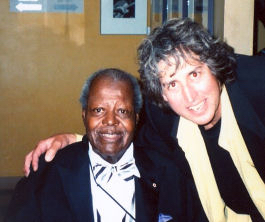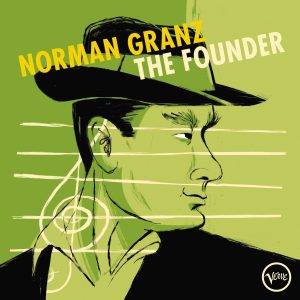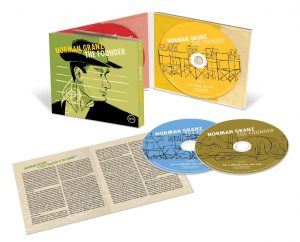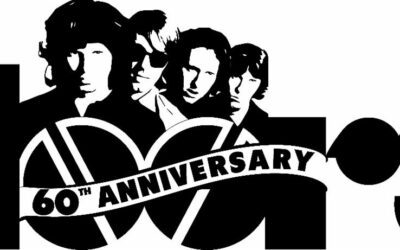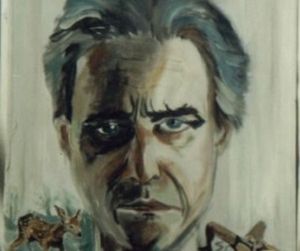APTLY- TITLED ALL-STAR FOUR- DISC BOX SET THE FOUNDER OUT ON DECEMBER 7TH VIA VERVE/UME
BY HARVEY KUBERNIK c 2018
In jazz circles, few names command more respect than Norman Granz. Although he wasn’t a musician, Granz (1918-2001) was as
responsible as any individual for popularizing jazz and promoting the careers of many of the genre’s greatest artists.
Granz’s incredible half-century career first took off with his creation of the groundbreaking Jazz at the Philharmonic concert series. But Granz was equally influential for the series of record labels that he launched in the 1940s and 1950s: Clef, Norgran and Verve.
Those companies became home to many of jazz’s most important and influential artists. And, unlike many of his contemporaries, Granz combined his love for the music with a passion for social justice, championing African-American musicians at a time when those musicians were often exploited and disrespected.
Now, in honor of the hundredth anniversary of Norman Granz’s birth, Verve/UMe has assembled The Founder, a four-CD/digital box set celebrating his remarkable life and career. The historic package features a massive chronological assortment of music spanning Granz’s remarkable career and featuring music by most of the great musicians he recorded.
Granz, a Los Angeles native, born near Central Ave., hailed from the integrated community of Boyle Heights. He graduated from Theodore Roosevelt High School, toiled as a clerk at the Los Angeles Stock Exchange, where he dealt with blatant anti-Semitism, then attended UCLA for two years, and worked as a film editor at M-G-M Studios in Culver City before devoting his life to the world of jazz.
Boyle Heights was first home of record producer Lou Adler, trumpeter/A&M Records co-founder, Herb Alpert, cantor Nathan Lam, actor/activist George Takei, L.A. Dodger baseball great, Willie Davis, and author Gene Aguilera.
The Founder package also includes illuminating liner notes by jazz historian and Granz authority Tad Hershorn, author of the Granz biography Norman Granz: The Man Who Used Jazz for Justice.
As Hershorn writes, “The underpinnings of Granz’s lifelong devotion to jazz came when, as a near-impoverished but ambitious UCLA student, he began his trek to African-American nightclubs along Central Avenue, not far from where he was born the son of Ukrainian Jewish immigrants…
“Granz hit the clubs almost nightly when musicians began welcoming him behind the scenes to observe rehearsals, after-hours clubs, and house parties. He saw them as ‘marvelous crucibles,’ hearing the friendly, intense competition as musicians challenged their peers and developed their styles. His early experiences led to his preference for musical blow-by-blow competition and emphasizing the emotional over intellectual qualities in jazz. Granz took it a step further when he aligned the jam session with the democratic ideal, whereby you could either stand and deliver, or you couldn’t. Skin color made no difference. ‘As in genuine democracy, only performance counts,’ Granz told the NAACP’s magazine, The Crisis, in 1947. ‘Jazz is truly the music of democratic America.'”
From a very early age, Granz had an inherent social change vision. His subsequent lifelong journey of inclusion and parity might have stemmed from an incident as a youth where he had witnessed the racial tensions of America seeing the Ku Klux Klan parading through the streets of Long Beach.
In 1945 Granz produced his first concert at the Philharmonic Auditorium in Los Angeles. A benefit for the accused suspects in the Sleepy Lagoon murder case. Lucky Thompson, Thelonious Monk, Helen Humes, Barney Kessel, Mead Lux Lewis and others were booked. A $1,000.00 was generated for the Sleepy Lagoon Defense Committee.
Granz’s parallel passions for jazz and fighting against racial discrimination was reflected in the ambitious artist lineups he assembled for his Jazz at the Philharmonic concerts, many of which are featured on The Founder.
These shows were almost single-handedly responsible for moving jazz from smoky clubs to prestigious theaters and, in the process, introduced jazz improvisation to new and receptive audiences. The series also helped to break down many of the era’s social barriers, showcasing a racially-mixed assortment of musicians and singers from a variety of musical backgrounds.
The four CDs that comprise The Founder encompass some of the most significant jazz music recorded in the 20th century, beginning with Granz’s founding of the Clef label in 1942 and culminating in his retirement and departure from Verve Records (which he’d launched four years earlier) in 1960.
Disc 1 opens in 1942, during the early wild-west days of independent label recording, with historic performances by such rising players as Dexter Gordon, Coleman Hawkins, Charlie Parker and Lester Young, who were among the first musicians that Granz recorded. Disc 1 also captures a young Nat “King” Cole, accompanied by Illinois Jacquet and Les Paul, on the crowd-thrilling “Blues,” which contrasts with the bouncy pop which would later make Cole a mainstream superstar.
Disc 2, which spans 1949-1954, finds Granz settled in at the top of the jazz world and recording a varied assortment of some of jazz’s leading lights, including the great pianist Oscar Peterson, charismatic vocalists Anita O’Day and Fred Astaire, and innovative bandleaders Count Basie and Benny Carter.
Disc 3, recorded between 1954 and 1957, encompasses the early years of the Norgran and Verve labels, which Granz founded during that period, and features historic performances by such icons as Billie Holiday, Ella Fitzgerald, Louis Armstrong, Bing Crosby, Lester Young and Lionel Hampton.
Disc 4, which covers 1957-1960, shows Granz ending on a high note , culminating his career at Verve with history-making performances by Dizzy Gillespie, Blossom Dearie, Sonny Stitt, Sonny Rollins, Stan Getz, Gerry Mulligan, Ben Webster, Paul Desmond, Stuff Smith, Lee Konitz, Jimmy Giuffre and Mel Tormé.
Norman Granz and his vast achievements made a monumental impact, not just in the world of jazz, but on global music culture. It’s hard to imagine a more appropriate tribute to Norman Granz’s visionary genius than this inspiring musical testament, The Founder.
Multi-instrumentalist and Willapa band member, David Kessel, CEO of CaveHollywood.com knew Norman Granz and offers some reflections on the man and the music he produced and championed on the 100th anniversary of Granz’s birth
“My dad Barney Kessel headed A&R for Norman Granz’s Verve label from 1956-1960, discovered Ricky Nelson and produced his debut hit record. Barney and Norman remained friends until 1990.
“Norman and my dad were foodies. They enjoyed top line restaurants like Pacific Dining Car and Musso & Frank. As well as the restaurants in Beverly Hills.
“One afternoon, Norman and Barney were driving, and there was a Verve office person in the back of Norman’s car. They were discussing where to eat. ‘PDC or Musso?’ And then the guy in the back seat says, ‘I know where we can get a great hamburger.’ And Norman then stops his car and immediately orders the passenger out of his vehicle. ‘Never say hamburger to me again!’”
“While at Verve, Norman got a phone call from a concerned record distributor around 1956 who made serious overtures and directive that Verve was going to be dropped unless he got some of this new rock ‘n’ roll at the label. ‘Get rock ‘n’ roll Barney!’
“As for Verve and the family atmosphere that existed at the label, and how close Norman’s artists were with my father, I remember a very late 1950’s or early sixties jam session at our family home in Van Nuys, California. [Pianist] Oscar Peterson was over for dinner with [bassist] Ray Brown.
“After the food went down, Barney picked up a guitar, Oscar went to the piano, and Ray picked up his bass. They started cookin’ in the living room and then Barney comically proclaimed afterwards, ‘that jam session was better than sex!’
“The reason we have Jazz the way it is today is because of Norman Granz.
His vision and guidance for the Verve artists as well as his pioneering civil rights activism on their behalf. In Jazz there is no color. You can be from Mars or have green skin, and if you can play with the cats you can sit in. Watching and learning the history of Verve from the forties onward, his Jazz at the Philharmonic concerts, the management of Ella Fitzgerald and other greats was really inspiring.
“I did a video tape interview with Oscar Peterson about ten years ago, just before he died. It was in Seattle, Washington at Jazz Alley. Oscar told me a story about Art Tatum and a recording session. In 1955 or in ’56. Norman is producing the date, and in a rare moment during the take the tape runs out in the middle of the tune. Norman says over the speakers, ‘Art, I’m really sorry. I let the tape roll out on you before it ended.’ And Art says, ‘put on a new reel and I’ll pick it up where I left off.’ And just before the machine starts up again, Norman says to Art, ‘what is that thing in your ear?’ And Art replied, ‘It’s the ear piece of my new transistor radio. I’m listening to the Ram’s football game.’”
THE FOUNDER TRACK LISTING
Disc 1: Mercury/Clef, 1942-1948
- I Blowed and Gone – Dexter Gordon
- Blues – Nat “King” Cole, Illinois Jacquet & Les Paul
- I Got Rhythm – Coleman Hawkins, Charlie Parker & Lester Young
- Picasso – Coleman Hawkins
- Sono – Harry Carney
- The Bloos – George Handy & His Orchestra
Disc 2: Mercury/Clef, 1949-1954
- Tenderly – Oscar Peterson Duo with Ray Brown
- Vignette at Verney’s – Ralph Burns Orchestra with Lee Konitz
- Lullaby of the Leaves – Anita O’Day
- The New Basie Blues – Count Basie and His Orchestra
- Con Poco Coco – Andre’s All Stars
- Castle Rock – Johnny Hodges
- Jeep’s Blues – Johnny Hodges
- (Ad Lib) Slow Dance – Fred Astaire
- No Strings (I’m Fancy Free) – Fred Astaire
- Flamingo – Benny Carter and His Orchestra
- With the Wind and the Rain in Your Hair – Tal Farlow
- Easy Living – Buddy DeFranco & Oscar Peterson Quartet
- Blues for the Count – Count Basie and His Orchestra
- They Can’t Take That Away from Me – Buddy DeFranco & Oscar Peterson
Disc 3: Norgran/Verve, 1954-1957
- I Thought About You – Billie Holiday
- I Thought About You – Ella Fitzgerald
- Like Someone in Love – Bud Powell
- Pig Ears and Rice – Lionel Hampton and His Orchestra
- Can’t We Be Friends – Ella Fitzgerald & Louis Armstrong
- Blue Room – Bing Crosby & Buddy Bregman
- Taking a Chance on Love – Lester Young & Teddy Wilson
- What A Little Moonlight Can Do – Billie Holiday
- Falling in Love with Love – Oscar Peterson Trio
- Yellow Rose of Brooklyn – Harry “Sweets” Edison & Buddy Rich
- Time After Time – Lawrence Brown
Disc 4: Verve, 1957-1960
- Day By Day – Coleman Hawkins Newport All-Stars feat. Pete Brown
- On the Sunny Side of the Street – Dizzy Gillespie, Sonny Stitt & Sonny Rollins
- It Never Entered My Mind – Stan Getz
- I Know That You Know – Stuff Smith
- D and E Blues – The Modern Jazz Quartet
- Budd Johnson – Ben Webster
- If I Were a Bell – Blossom Dearie
- Chelsea Bridge – Gerry Mulligan & Ben Webster
- Line for Lyons – Gerry Mulligan & Paul Desmond
- Somp’m Outa’ Nothin’ – Lee Konitz & Jimmy Giuffre
- Thank You Charlie Christian – Herb Ellis
- Lonely Town – Mel Tormé & Marty Paich Orchestra
- Evil Eyes – Terry Gibbs Big Band
(Harvey Kubernik is an award winning author of 15 books. His literary music anthology Inside Cave Hollywood: The Harvey Kubernik Music InnerViews and InterViews Kollection, Vol. 1 was published in December 2017, by Cave Hollywood. Kubernik’s The Doors Summer’s Gone was published by Other World Cottage Industries in February 2018.
During November 2018, Sterling/Barnes and Noble published Kubernik’s The Story of The Band From Big Pink to the Last Waltz. Kubernik is a native Angeleno, born in Echo Park and raised during the fifties in downtown Los Angeles and later Crenshaw Village).

